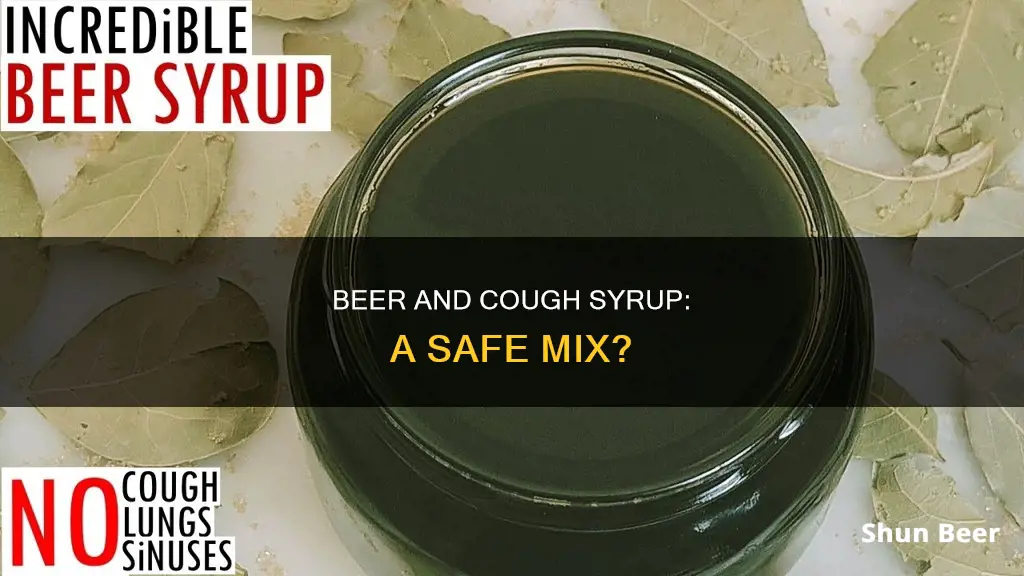
Drinking alcohol while taking medication is a common question for pharmacists. While moderate alcohol consumption can have some health benefits, excessive drinking increases the risk of liver disease, high blood pressure, diabetes, and stroke. Alcohol can also interfere with how the body processes medication and can create or worsen side effects. Cough syrup often contains dextromethorphan, which can have dangerous interactions with alcohol, increasing the risk of overdose, respiratory depression, and even death. Even cough syrups that don't directly interact with alcohol can cause dehydration and weaken the immune system. It is generally advised to avoid alcohol while taking any cough medication and to opt for alcohol-free cough syrup formulations if necessary.
| Characteristics | Values |
|---|---|
| Should I drink a beer while taking cough syrup? | No |
| Why? | It can lead to increased dizziness, drowsiness, impairment of coordination, and even more severe effects if the cough medication already contains alcohol. |
| Certain ingredients found in cough syrups, such as dextromethorphan or codeine, can have dangerous interactions with alcohol, increasing the risk of overdose, respiratory depression, and even death. | |
| Alcohol can cause symptoms of illness to worsen, cause dehydration, and weaken the immune system. |
What You'll Learn

The dangers of mixing dextromethorphan and alcohol
Dextromethorphan (DXM) is a common ingredient in over-the-counter cough medicines. It is a central nervous system (CNS) depressant that causes feelings of relaxation, sleepiness, and a pleasing euphoria. When taken as directed, it is well-tolerated and can be effective in relieving coughing caused by a cold, the flu, or allergies.
However, mixing dextromethorphan with alcohol can be extremely dangerous and lead to severe and unpredictable side effects. Both substances have similar effects on the body, and when combined, they can cause additive side effects, increasing the risk of overdose. Dextromethorphan and alcohol both interact with NMDA receptors in the brain, which can lead to a loss of motor coordination and sedation.
The acute risks associated with mixing dextromethorphan and alcohol include respiratory depression, irregular heart rate, dissociation, brain lesions, seizures, and even permanent psychosis. These risks are heightened when dextromethorphan is taken in large doses, as recreational users may do to get high.
Additionally, consuming alcohol while sick can prolong your illness and weaken your immune system. Therefore, it is strongly advised to avoid alcohol while taking any cough medication containing dextromethorphan or other similar ingredients.
Concussion and Beer: A Dangerous Mix?
You may want to see also

The effects of alcohol on the body
Drinking a beer while taking cough syrup is not recommended, as the combination of alcohol and cough syrup can lead to dangerous side effects, including increased dizziness, drowsiness, impaired coordination, and even more severe consequences if the cough medication contains alcohol or certain active ingredients.
Now, let's delve into the effects of alcohol on the body in more detail:
Alcohol can have a range of detrimental effects on the body, both immediate and long-term, and it is essential to understand these consequences to make informed decisions about alcohol consumption. The impact of alcohol on the body depends on various factors, including the amount consumed, the pattern of drinking, body composition, age, genetics, and social factors. Here is a comprehensive overview:
Short-Term Effects
Alcohol can cause a variety of short-term effects, commonly known as a "hangover." These effects can include interpersonal conflict, altered behavior, risky or violent behavior, dehydration, stomach irritation, a drop in blood sugar, and an expansion of blood vessels. Additionally, drinking too much on a single occasion can lead to alcohol poisoning, which is a life-threatening emergency. Other immediate risks include injuries, accidents, violence, and alcohol overdose, especially when mixed with other drugs.
Long-Term Effects
Long-term alcohol consumption is linked to numerous health issues and contributes to over 200 types of diseases and injuries, according to the World Health Organization (WHO). Some of the most common alcohol-related harms include accidents, violence, cardiovascular disease, and various cancers, including oral cavity, pharynx, larynx, esophageal, liver, colorectal, and breast cancer. Excessive drinking can also lead to malnutrition, overweight, and obesity. Alcohol consumption during pregnancy can result in miscarriage, stillbirth, or fetal alcohol spectrum disorder (FASD).
Alcohol's long-term effects can also impact mental health, with an increased risk of anxiety and depression, and interference with antidepressant medication. It can cause cognitive impairment, self-harm, and addiction. Additionally, alcohol consumption can affect all aspects of a person's life, including physical and mental health, work, finances, and relationships.
Impact on Specific Organs
- Brain: Alcohol interferes with the brain's communication pathways, affecting mood, behavior, clear thinking, and coordination.
- Heart: Heavy drinking can damage the heart, leading to cardiomyopathy, arrhythmias, and high blood pressure.
- Liver: Long-term alcohol use can cause liver inflammation and conditions such as steatosis, or fatty liver.
- Pancreas: Alcohol causes the pancreas to produce toxic substances, leading to pancreatitis, a dangerous inflammation that causes swelling, pain, and impaired enzyme and hormone production.
- Immune System: Excessive drinking weakens the immune system, making individuals more susceptible to diseases like pneumonia and tuberculosis.
Beer Alternatives for Actors: What's in Their Steins?
You may want to see also

The side effects of cough syrup
Drinking alcohol while taking cough syrup can lead to a range of side effects, and it is generally advised to avoid mixing the two. Cough syrup often contains ingredients such as dextromethorphan, codeine, or guaifenesin, which can have dangerous interactions with alcohol.
Dextromethorphan and alcohol are both central nervous system (CNS) depressants, causing relaxation, sleepiness, and a euphoric feeling. When combined, they can cause additive side effects, increasing the risk of overdose, respiratory depression, and even death. Dextromethorphan, on its own, is a widely abused drug, and mixing it with alcohol can lead to brain lesions, memory problems, and behavior issues.
Codeine-containing cough syrups also carry a high potential for abuse and dependence, leading to overdose and death. When combined with alcohol, the manufacturers of these cough syrups warn of "profound sedation, respiratory depression, coma, and death."
While guaifenesin, an expectorant found in some cough syrups, does not directly interact with alcohol, consuming alcohol while sick can worsen symptoms, cause dehydration, and weaken the immune system. Alcohol can also interfere with sleep, which is crucial for recovery from illness.
In addition to these specific interactions, mixing alcohol with certain medications can cause nausea and vomiting, headaches, drowsiness, fainting, loss of coordination, internal bleeding, heart problems, and breathing difficulties. Alcohol can also make a medication less effective or even harmful to the body.
Therefore, it is essential to avoid mixing alcohol with cough syrup to prevent harmful side effects and health risks.
Beer: A Surprising Remedy for Ethylene Glycol Poisoning?
You may want to see also

The risks of combining central nervous system depressants
Central nervous system (CNS) depressants are drugs that slow down brain activity, making them useful for treating anxiety, panic, and sleep disorders. CNS depressants include medications such as sedatives, tranquilizers, and hypnotics, which are prescribed by doctors to help patients with various health needs. While these medications can be beneficial when used as directed, they also come with certain risks, especially when combined with other substances like alcohol.
When CNS depressants are combined with other central nervous system depressants, such as alcohol, the risks of serious complications are greatly magnified. This is because both substances have similar effects on the body, including relaxation, sleepiness, and euphoria. As a result, mixing these substances can lead to additive side effects and increase the risk of overdose. The combined effects of CNS depressants and alcohol can include respiratory depression, or irregular, slowed, or stopped breathing, dissociation or feelings of being out of one's body, brain lesions leading to memory loss and behavioural changes, and even permanent psychosis.
In addition to the acute risks, combining CNS depressants with alcohol can also lead to long-term negative consequences. Chronic alcohol use, when combined with CNS depressants, can lead to dependence, addiction, and severe withdrawal symptoms when attempting to stop. Additionally, the risk of developing a substance use disorder is heightened when CNS depressants are combined with alcohol. This may lead individuals to seek stronger feelings of euphoria by taking higher doses of their medication or mixing it with other substances, further increasing the risk of overdose and adverse health reactions.
Furthermore, the effects of combining CNS depressants with alcohol can be unpredictable. As CNS depressants already have the potential to affect concentration and coordination, mixing them with alcohol can impair judgement and coordination even further, increasing the risk of accidents or injuries. This is especially dangerous when driving or operating heavy machinery, as it can compromise one's ability to respond to unexpected situations.
Overall, it is important to recognize the risks associated with combining central nervous system depressants. While these substances can be beneficial when used as directed by a healthcare professional, mixing them with alcohol can lead to severe and sometimes life-threatening consequences. It is always advisable to consult a doctor or pharmacist before consuming alcohol with any medication to ensure a safe and informed decision.
Beer and Homeopathy: Is It Safe to Mix?
You may want to see also

How to treat a cough without medication
Drinking alcohol while taking cough syrup is not recommended, as it can lead to increased dizziness, drowsiness, and impaired coordination. Certain ingredients in cough syrups, such as dextromethorphan or codeine, can have dangerous interactions with alcohol, increasing the risk of overdose, respiratory depression, and even death.
Stay Hydrated
Drinking plenty of fluids helps to thin the mucus that drips down the back of your nose, making it less likely to irritate your throat and trigger a cough. Aim for at least 8 glasses of water per day, but more is better. Staying hydrated also helps your lungs clear out the discharge more easily.
Honey
Honey has anti-inflammatory properties and can help soothe a scratchy throat. It has been found to be as effective as over-the-counter drugs in calming nighttime coughs. Take a tablespoon of honey as needed, or stir it into a warm drink. However, do not give honey to babies under one year of age.
Hot Drinks
Sip on hot drinks like tea, broth, or herbal tea with honey. The heat from the liquid helps to lower congestion, and the liquids are hydrating. Ginger tea is an excellent choice, as ginger has anti-inflammatory properties and can help relax the smooth muscles in your airways.
Gargle Saltwater
Gargling with saltwater can help soothe a sore throat and loosen thick mucus. It can also help clear away allergens and bacteria. Mix 1/2 teaspoon of salt into a glass of warm water, gargle, and then spit it out.
Moisturize the Air
Use a humidifier or take a steamy shower to add moisture to the air and help loosen mucus and congestion. A humidifier can also help ease breathing and make you more comfortable while sleeping. Be sure to clean and change the filter in your humidifier as directed by the manufacturer.
Clear Irritants
Remove potential irritants from your environment, such as smoke, pollen, or perfumes. These irritants can trigger the cough reflex and slow down the healing process. If you have allergies, clean away mold, dust, and pollen. Wash your bedding regularly, vacuum with a HEPA filter, and consider using an air purifier to reduce allergens and irritants in the air.
Sleep on an Incline
If your cough is due to a cold or allergies, try sleeping with your head elevated. When you lie flat, mucus can pool and irritate your throat. Use extra pillows or raise the head of your bed slightly to help reduce mucus buildup in your throat.
Craft Beer Festivals: All-You-Can-Drink Events?
You may want to see also
Frequently asked questions
No, it is not advised to drink alcohol while taking cough syrup. Cough syrup often contains dextromethorphan or codeine, which can have dangerous interactions with alcohol, increasing the risk of overdose, respiratory depression, and even death.
Combining cough syrup and alcohol can lead to increased dizziness, drowsiness, impaired coordination, nervousness, upset stomach, and even more severe effects if the cough medication already contains alcohol.
If you want to drink alcohol, it is best to avoid taking cough medication at the same time. You can ask your pharmacist or doctor for advice on how long to wait after taking cough syrup before consuming alcohol.







